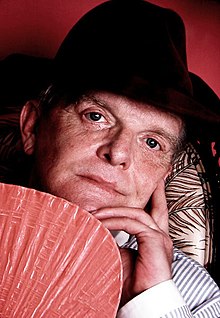Truman Capote
| Truman Capote | |
|---|---|

Truman Capote, 1980
|
|
| Born |
Truman Streckfus Persons September 30, 1924 New Orleans, Louisiana, U.S. |
| Died | August 25, 1984 (aged 59) Bel Air, Los Angeles, California, U.S. |
| Cause of death | Liver disease and phlebitis brought on by multiple drug intoxication |
| Resting place |
Westwood Memorial Park Los Angeles, California, U.S. |
| Other names | Truman Garcia Capote |
| Occupation | Artist, author, actor |
| Partner(s) | Jack Dunphy |
| Writing career | |
| Education | Timothy Dwight School |
| Period | 1943–1984 |
| Literary movement | Southern Gothic |
| Notable works | In Cold Blood, Breakfast at Tiffany's |
|
|
|
| Signature | |
Truman Garcia Capote (/ˈtruːmən kəˈpoʊtiː/; born Truman Streckfus Persons, September 30, 1924 – August 25, 1984) was an American novelist, screenwriter, playwright, and actor, many of whose short stories, novels, plays, and nonfiction are recognized as literary classics, including the novella Breakfast at Tiffany's (1958) and the true crime novel In Cold Blood (1966), which he labeled a "nonfiction novel". At least 20 films and television dramas have been produced of Capote novels, stories, and plays.
Capote rose above a childhood troubled by divorce, a long absence from his mother, and multiple migrations. He had discovered his calling as a writer by the age of 8 (The Dick Cavett Show, aired August 21, 1980), and for the rest of his childhood he honed his writing ability. Capote began his professional career writing short stories. The critical success of one story, "Miriam" (1945), attracted the attention of Random House publisher Bennett Cerf, and resulted in a contract to write the novel Other Voices, Other Rooms (1948). Capote earned the most fame with In Cold Blood, a journalistic work about the murder of a Kansas farm family in their home. Capote spent four years writing the book aided by his lifelong friend Harper Lee, who wrote To Kill a Mockingbird (1960).
...
Wikipedia
